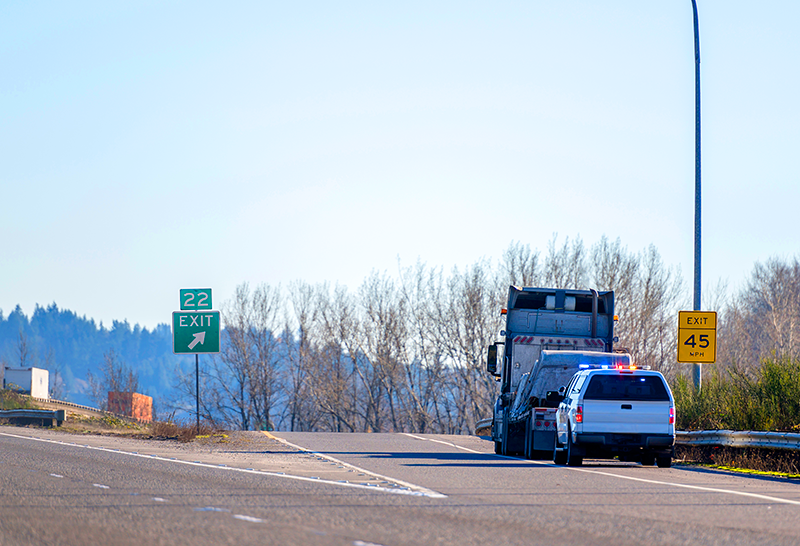Drug, alcohol violations on CVSA Roadcheck agenda in 2024

This year from May 14-16, the Commercial Vehicle Safety Alliance’s (CVSA) will host its annual International Roadcheck, according to an announcement on its website. The event is a high-visibility, high-volume commercial motor vehicle inspection that takes place over three days in Canada, Mexico and the United States.
As part of the regulatory compliance enforcement initiative, law enforcement personnel who are certified by the CVSA will inspect commercial motor vehicles and drivers at weigh and inspection stations, temporary sites, and via mobile patrols to verify compliance with federal, state, and local regulations.
CVSA is a nonprofit organization comprised of local, state, provincial, territorial and federal commercial motor vehicle safety officials and industry representatives in Canada, Mexico and the US. The Alliance aims to prevent commercial motor vehicle crashes, injuries and fatalities and believes that collaboration between government and industry improves road safety and saves lives.
Each year, International Roadcheck places special emphasis on a category of violations. This year, International Roadcheck will have two focus areas – tractor protection systems and alcohol and controlled substance possession.
Controlled substance and alcohol possession and use remain a major concern for motor carriers, drivers, and the general public. The number of prohibited drivers listed in the U.S. Drug and Alcohol Clearinghouse (DACH) continues to increase. This trend poses a threat to all motorists who travel on roadways throughout North America.
According to the CVSA, this year’s Roadcheck will serve as a reminder to motor carriers to establish and strictly enforce policies that prevent controlled substance and alcohol possession or use in the workplace. In addition, U.S. motor carriers are advised to regularly check the Clearinghouse to ensure that their drivers are not in prohibited status.
Commercial motor vehicle drivers are reminded to adhere to their company’s policies and to not possess, use or be under the influence of alcohol or controlled substances while on duty. Inspectors are reminded to be vigilant in the detection and interdiction of such driver violations during every inspection.
In addition, by focusing on the tractor protection systems, the CVSA aims to increase awareness for drivers, motor carriers, technicians and enforcement personnel of these important vehicle components; specifically the tractor protection valve, trailer supply valve and anti-bleed back valve, which may be overlooked during trip and roadside inspections.
To assist drivers and motor carriers in the proactive assessment and maintenance of those components, CVSA has provided an inspection bulletin outlining the steps on how to properly check tractor protection systems.
Over the three days of International Roadcheck, inspectors will conduct their routine North American Standard Level I Inspection, which is a thorough 37-step inspection procedure consisting of the examination of vehicle components and driver documentation and requirements.
During the vehicle portion of the Level I Inspection, inspectors check to make sure that each vehicle’s brake systems, cargo securement, coupling devices, driveline/driveshaft components, driver’s seat, fuel and exhaust systems, frames, lighting devices, steering mechanisms, suspensions, tires, wheels, rims, hubs, and windshield wipers are compliant with regulations.
A vehicle that successfully passes this Inspection without any critical vehicle inspection item violations may receive a CVSA decal, which is valid for three months.
If out-of-service violations, as outlined in the North American Standard Out-of-Service Criteria, are found during an inspection, the vehicle will be restricted from operating until all out-of-service violations have been properly addressed.
During the driver portion of an inspection, inspectors will check the driver’s operating credentials, hours-of-service documentation, Clearinghouse status, seat belt usage, and for alcohol and/or drug impairment.
If an inspector identifies driver out-of-service violations, such as not possessing a valid or necessary operating license or exhibiting signs of impairment, the inspector will restrict that driver from operating their vehicle.
For International Roadcheck, in case of inclement weather or other limiting circumstances, instead of a Level I Inspection, a jurisdiction or an inspector may opt to conduct a Level II Walk-Around Driver/Vehicle Inspection or Level III Driver/Credential/Administrative Inspection, neither of which are eligible for a CVSA decal.
Data from the 72 hours of International Roadcheck will be collected and the results will be released this summer.



